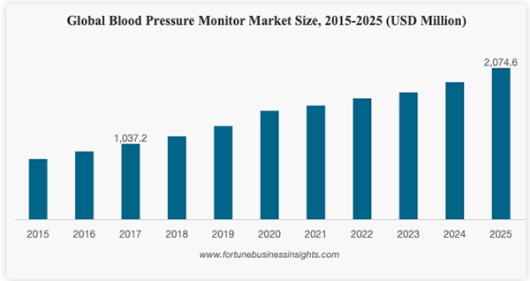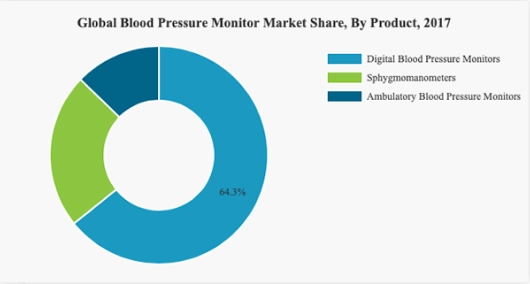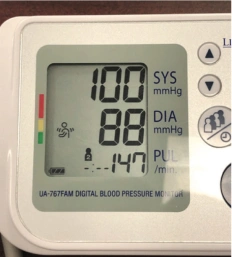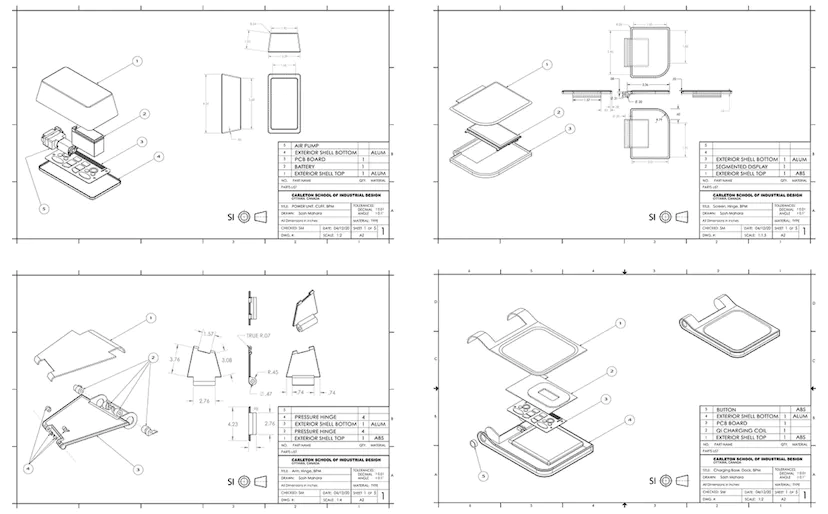Core.
Product redesign of a blood pressure monitor with a mobile application geared towards athletes.
Industrial Design - User Research - UX/UI Rapid Prototyping - CAD

Duration
3 Months
Role
Product Designer
Type
Individual Project
Methods & Tools
Secondary Research, Market Research, User tests, Product autopsy, 3D printing
Overview
This third year project prompted students to choose an already existing product and analyze its use. From there the objective was to redesign the product for a new environment or user group using research into economics, existing technology, user needs, and manufacturing.
Problem
Many professional and amateur athletes track their blood pressure to monitor existing conditions or prevent future health complications. These users require a device that can fit their active lifestyle and send their health data to their coaches or health professionals. Most blood pressure monitors are not designed for quick everyday use and frequent portability. Furthermore most blood pressure monitors have connectors and wires that make it cumbersome to operate.
Process

Research
Through research it was found that many professional athletes actually suffer from high blood pressure also known as hypertension. In fact hypertension was found to be the most common cardiovascular complication affecting athletes. Further more sudden cardiac arrest is the leading cause of death in young athletes. As a result most athletes today use some type of digital tool to track their vitals, training, and recovery to help monitor their health and give themselves a competitive edge.

Market Economics
Within the research phase, the blood pressure monitor (BPM) market was evaluated. BPM market economics data shows that the demand for BPMs is projected to increase due to urbanization and modernization worldwide. The 1.5 billion dollar industry is projected to grow to a further 2.7 billion dollars by 2025. Most popular BPM devices on the market today are digital monitors.


Analysis
Research was done into the life of a professional athlete to see what their daily routine was and how they utilize health devices in their day to day tasks. After learning more about the specific user, product testing was done using a real blood pressure monitor while keeping their persona in mind. The goal was to see what the experience would be for this person when using a blood pressure monitor.
Persona

Sami trains for 5 hours on a typical day. He will Start his day early with a large breakfast and a health analysis going over his muscle and joint pain, as well as any cold or flu symptoms. He inputs his health data into a fitness recovery program which will assess if he is okay to train again or if he should take a rest day. His first training routine is 2 hours long. After this he will eat lunch and take a nap. Around midday he will have another meal and begin his second 2 hour training session. In the evenings he will spend time with his family and have dinner. After dinner he will do light exercise such as running or cycling before winding down for bed at 10pm.
User Analysis


Project Autopsy
The blood pressure monitor was then taken apart to learn more about the size and shape of the internal components and the technology behind the device.

Product Deconstruction

Product is not well designed for easy storage. This makes daily use annoying and mess.

Product display is outdated and could use a refresh.
The key components were measured and cut out into shapes that mimicked their size. These were then used to ideate a new component layout, and to help guide a more feasible design.

Ideation & Concept Development
The blood pressure monitor was then taken apart to learn more about the size and shape of the internal components and the technology behind the device.
Product Inspiration
Taking a look into modern fitness products, current product trends lean towards clean and minimal designs. Most products have neutral colors with black and white being the most common.

High-end health and fitness products
Initial Sketches
The idea started off by trying to explore solutions for a blood pressure monitor that could be used wirelessly and charge on a dock when not in use. Focus was kept on making sure the display could face the user and not be hard to see.

Concept sketches for a wireless device
From the ideation sketches low-fidelity mock-ups were constructed to test the ideas and rank them among each other. Model 4 ranked the highest in user testing due to its simple form factor, ease of cuff storage and easy to see display position.

User testing different forms
Final Concept
Although the finalized concept addressed many of the pain points from our original blood pressure monitor, it still had a few shortcomings that were discovered. The main issue with the finalized concept was that it did not allow for easy portability as the form was difficult to store. Further ideation was needed to increase portability and reduce the form factor for traveling purposes. Exploration into a collapsible device was investigated.
Final concept sketch
Pivot & Takeaways
Although the finalized concept addressed many of the pain points from our original blood pressure monitor, it still had a few shortcomings that were discovered. The main issue with the finalized concept was that it did not allow for easy portability as the form was difficult to store. Further ideation was needed to increase portability and reduce the form factor for traveling purposes. Exploration into a collapsible device was investigated.

Iterative sketches to explre new hinge mechanics
![]()
New lo-fi concept with changes applied
Final Design
The refined concept was taken further and modeled on SolidWorks. Using CAD software allowed for further development as the folding and hinge mechanics could be worked out and the overall form could be understood more clearly. After finalizing the CAD model a physical model was made using 3D printed ABS plastic.


ABS 3D printed prototype

Technical Drawings

Painting Process



UX/UI Development
Current market trends for modern blood pressure monitors shows that internet of things is becoming increasingly popular. Many new devices coming onto the market today feature connectible phone apps to enhance the devices use and tracking potential. Following this a connectible app was also designed to go along with the redesigned blood pressure monitor.

Wireframing user flows

UI Mockup
Final Presentation
My Other Projects
That project does not exist!

